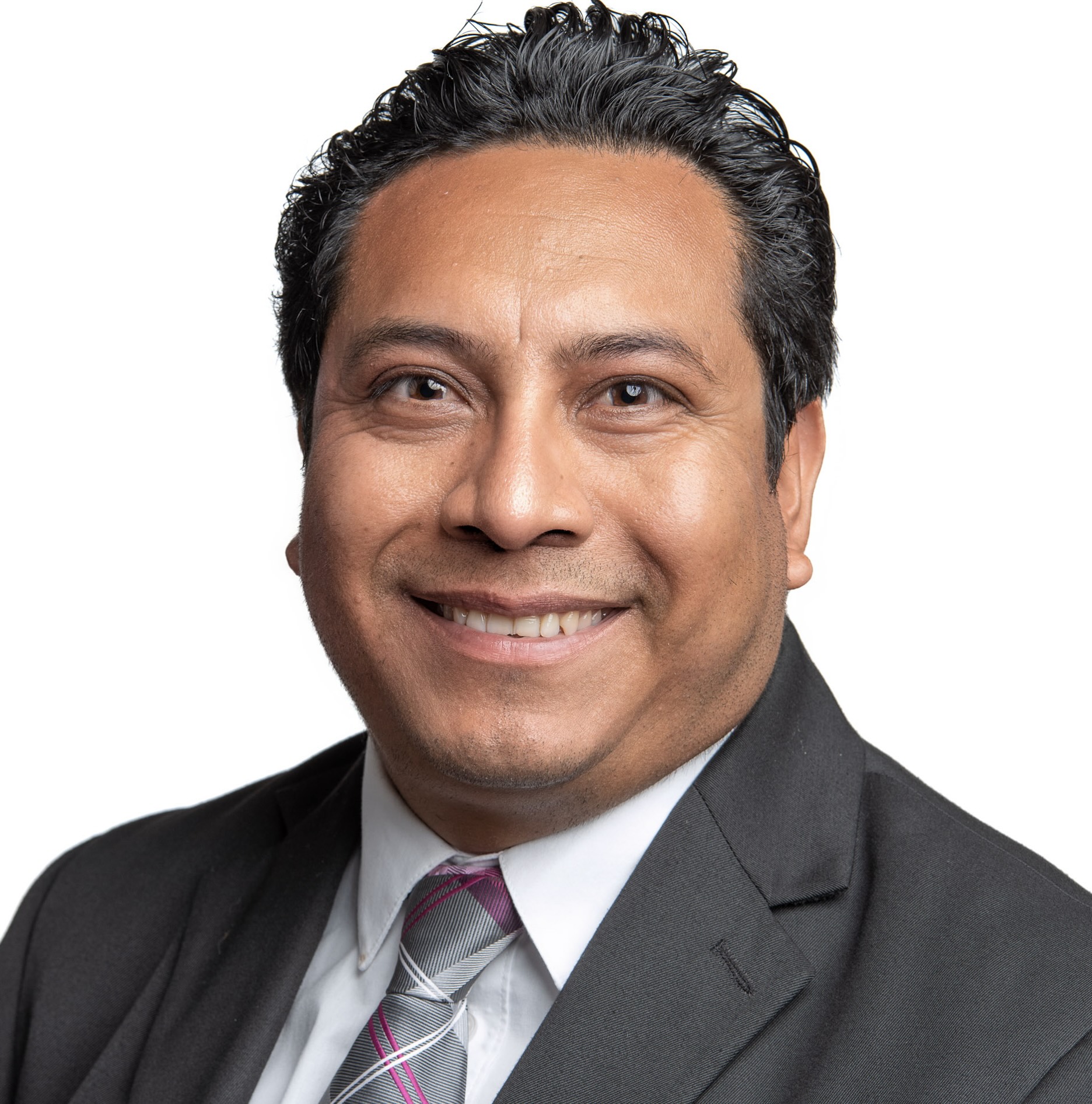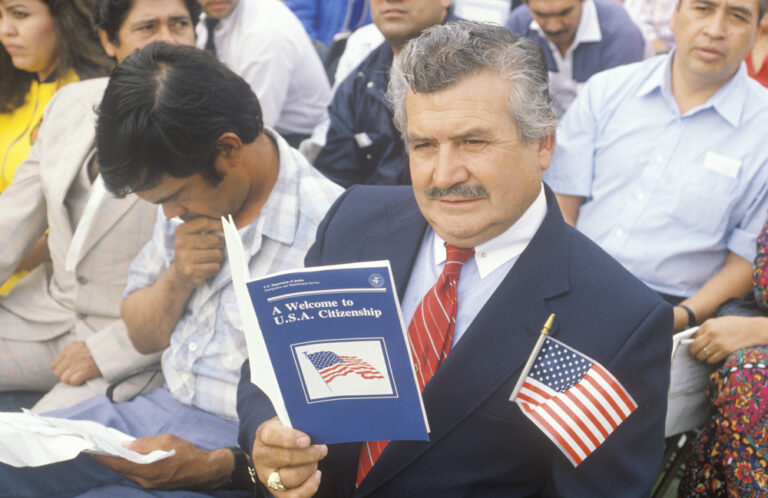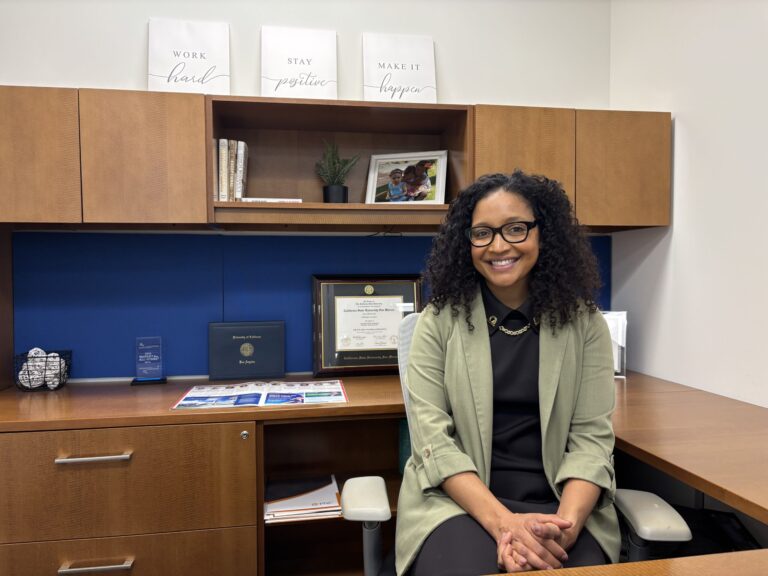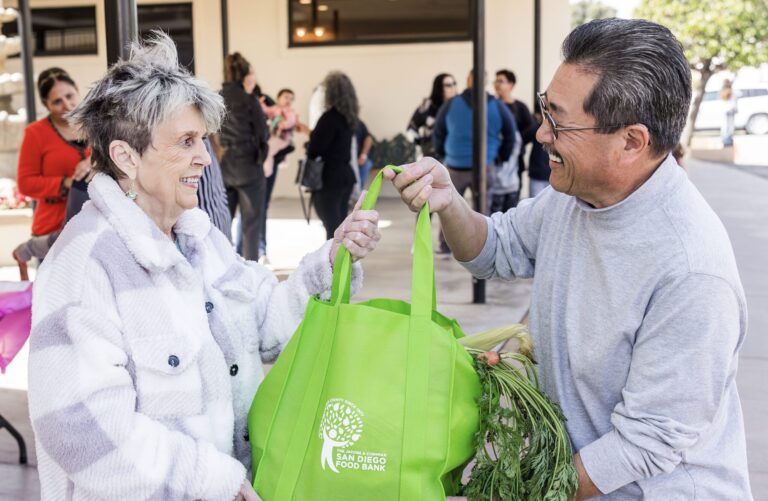Universidad Popular Education and Outreach Programs
- Citizenship & Civic Education
- Citizenship Exam preparation
- Health & Wellness
- Food Justice
- Food distribution in Pauma and Valley Center
- Cultivating Leadership
- Training for community promotors
- Emergency Preparedness
- Workers’ rights
By Melanie Slone
“Things are not going to be handed to us…We need to get out and work,” Francisco Ramirez tells us.
Francisco has been with Universidad Popular, based in San Marcos, for about 10 years, first as a volunteer and now as a staff member who leads the community in civic engagement.
Universidad Popular (UP), founded by sisters María and Arcela Nuñez, accompanies and supports immigrants on their path to become citizens and offers courses to engage the community. “We accompany the students once they’re ready to do the citizenship interview,” Francisco says. “We’re not lawyers. We don’t provide legal support, but we do provide the moral support and interpretation services.”
UP also covers how to get involved at the local, state, and federal levels. “I think if people want to see a change, they need to start making that change happen,” says Francisco. “No one else will do it for us; we need to take leadership and start showing up and participating…making sure we have the things we need to have life, liberty, and the pursuit of happiness, as the Constitution states for us.”
He urges community members to go out and work for what they want and need. “Go to class, participate, go to city council meetings. Or watch the recordings of city council meetings,” he says.
You don’t have to be a citizen to participate. In fact, Francisco is not yet a citizen. “I’m not eligible to vote,” he says. “Until three years ago, I wasn’t even documented. I was living in what they call ‘the shadows.’”
Yet, he attends city council meetings in Escondido where he lives, in San Marcos where he works, and in Vista and Oceanside. “Whenever there’s a topic that affects us, I go, and I voice my opinion…my complaints.” He is grateful to Universidad Popular for providing the tools, knowledge, education, and interpretation services to participate.
Now a permanent resident, Francisco hopes to become a citizen soon. “But I want to make sure we understand that you don’t have to be citizens to participate civically,” he says. You can attend city council meetings and ask questions even if you can’t vote. “It’s our right and it’s our responsibility to participate in our democracy,” he says.
“It wasn’t easy for me either,” he tells us. “We need to understand that we are here. We live here…We need to participate.”
People may not understand politics, may think it doesn’t affect them. Francisco reminds them that they have a say in their schools, streets, clinics, parks, public safety, and police.
He hears people complain that their electricity or water bill is too high, or there are long lines at the clinics, and he tells them, “There are people making those decisions for us. If we don’t participate, we don’t have a say.”

The Immigrant Experience
Born in Querétaro, Mexico, Francisco moved to Escondido when he was 12. “I was in the United States, in Escondido, as an immigrant, not knowing the language, not knowing the city, not knowing the country,” he says.
He remembers his struggles. “Coming from a really small town with maybe no more than 30 students, now coming to a school with 1,000 students…One of the scariest moments in my life was being part of this big school in Escondido.”
A firm believer in the importance of education, Francisco was determined to get his bachelor’s degree. After transferring from Palomar and MiraCosta Colleges, he became the first in his family to achieve that dream, at Cal State San Marcos, where he majored in communication.
“I’m still thinking about maybe getting a master’s or a PhD in the future,” he says.
He feels his battle was not unique. Like many others, he struggled to write in both English and Spanish, never imagining someday his writing would be published.
“In 2018, I, alongside one of my professors at CSUSM, coauthored a chapter of a book in which we showed how community members come together to combat hate with love and unity,” he says. Seeing his chapter in the book Constructing Narratives in Response to Trump’s Election: How Various Populations Make Sense of an Unexpected Victory showed him that anything is possible.
Still, he knows how hard it can be. “I believe that education should be accessible for everyone,” he says. One of his biggest challenges was that as an undocumented immigrant, he had little support to attend a four-year college, with no grants, in-state tuition, financial aid, or scholarships. “The reality was that I needed support, and there was no support for me at that time,” he says.
“As the years passed, more people like me wanted that same opportunity; I think more doors opened.” But money is still an issue. “It’s still not easy because it’s expensive for a lot of people to have a higher degree,” he adds.
Francisco considers himself fortunate to have been able to become a permanent US resident after arriving undocumented and being considered a Dreamer, a label he does not accept. “That separates me from the rest of my family who also deserve to have relief and be able to pursue happiness and liberty,” he says.
“It does not end with me,” he adds. He fights for everyone to be able to live “without the fear of family separation or the complicated journey that often ends in death for some seeking a new life.” His wish is for all families to be reunited and able to achieve “a democracy that is truly for all.”

Inspiration and Trust
Francisco says working with Arcela and María Nuñez and the team inspires him. “The team teaches me every day to treat everyone with respect and dignity,” he says. “We’re part of the community that we serve, that we work with.”
He saw the real impact Universidad Popular has on the community during the Covid-19 pandemic.
“People didn’t trust the vaccines, and they didn’t trust the county,” he remembers. “It’s one of those times that they ask you for your information, for your ID, and you’re hesitant…you don’t know who’s asking and what are they going to do with that information.”
Francisco and the other UP volunteers and staff were able to be the trusted messengers, he says. “It was really hard to convince people,” he says. “But I think we had created a movement where the people already looked for us and trusted us.”
The most important thing was for community members and their families to be safe, he says, and he’s glad he was able to help provide trustworthy information and resources to make sure they were.
UP team members understand that providing outreach and education “is the only way to move forward as a community and dismantle all the myths or misinformation,” he says.
Finally, he is grateful today for the guidance and support of others. “Having the support of mentors, the love of family and friends gives me the confidence to overcome any challenge or barrier in my life,” he says.
“I have not overcome so many barriers on my own. There have been people next to me who have given me economic or moral support or whatever I’ve needed, my parents, my siblings, and my partner who has always believed in me and is proud of both our achievements.”




